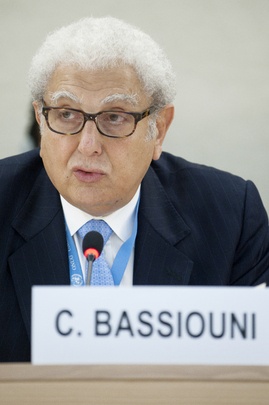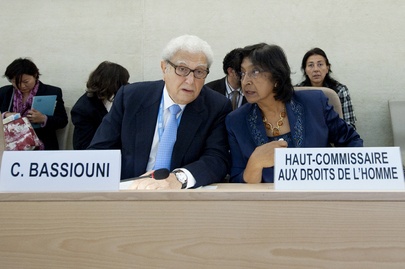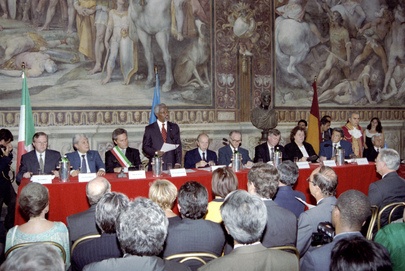


This time though it is not a UN mandated assignment, but Bahrain’s government has itself invited the renown international human rights and legal expert, just after he has concluded an investigation and report on behalf of the UN Human Rights Council. If the Bahrain government is looking for credibility in its self-assessment, Professor Cherif Bassiouni will provide that and independence. Of course, that last part may become a point of contention. With Bassiouni’s reputation will also come a sincere effort at the truth of what happened.
Professor Bassiouni and a commission he is designated to head will investigate what went on during mass protests in February and March, and the violent crackdown on the largely Shiite opposition that ensued. According to media and several UN based reports, more than 30 people died, hundreds were detained and beaten, and thousands were fired from their jobs. The Commission of international investigators are taking testimony from both the government and the opposition. The commission will then issue a report and recommendations to Bahrain's king.
A Precedent in International Human Rights:
Unlike the 9/11 Commission, which was made up of former politicians, or a U.N. commission that investigates a country whether the ruler likes it or not, the Bahrain commission is perceived as different by Professor Bassiouni: "This is a first of its kind in the world," he says. "That is, for a government to appoint a commission of inquiry but to select the composition of the committee from international personalities and to give it total independence."
Bassiouni “Underwhelmed” by Bahrain Crackdown Compared to Bosnia Ethnic Cleansing?
According to NPR article, “some Bahrainis say they worry Bassiouni might be too close to the government. In an interview, he seemed underwhelmed by the scale of Bahrain's crackdown, compared with the ethnic cleansing in the former Yugoslavia, for example. the commission is paid by the government of Bahrain. And Bassiouni's schedule is carefully managed by former government employees."
Bassiouni offers that if members of Bahrain's security forces are found to have engaged in grave violations of international humanitarian law, the Commission will recommend prosecution. What he says he can't control is whether these recommendations are heeded or whether those who ordered the torture will ever be known.
He says he hopes the commission will at least serve as a public record — a kind of South African Truth and Reconciliation Commission on paper — that might one day help the disenfranchised Shiite majority of Bahrain reconcile with the country's Sunni leadership. (From NPR)
Rule of Law or Political Issue:
Much of the opposition appears already inclined to marginalize the work of the Commission, even if not all would directly question Bassiouni’s integrity or credentials. They define Bahrain’s problem as political rather than one of individual cases of abuse. Whether such is the ultimately the case though, democracy and freedom are based upon the rule of law.
Professor Bassiouni has been instrumental in the initial efforts of the International Criminal Tribunal for the former Yugoslavia (ICTY) – I credit him as one of four people responsible for securing the reality of a functional ICTY rather than allowing the promise to fade into mere rhetoric, as some UN members had intended at the outset. He was a defining factor at the Rome Conference (Bottom PHOTO) establishing the International Criminal Court. His work from Africa to Afghanistan has garnered credit for professionalism and independence. While capable and agile in moving among political circles from Washington to the United Nations, he has resigned rather than soil his reputation. He has enemies as well as admirers. As in the case of his efforts toward the ICTY and the ICC, he understands that the memory of history can be as important as offending those who for the moment see themselves as the puppeteers.
Perhaps the Bahrain government may find him ultimately too independent minded. However, the opposition also should not so quickly disregard the weight of his words as it relates to an international legal record of what occurred and what should next happen in the evolution of Bahrain’s Arab revolution.
(As a matter of record, Professor Cherif Bassiouni has been a friend and served as my legal counsel).
Related ARTICLE – “Bahrain End of State of Emergency”
diplomaticallyincorrect.org/films/blog_post/bahrain-end-of-state-emergency-dialogue-welcomed-by-un-secretary-general-by-ambassador-mo/28543
Related ARTICLE – “War Crimes Against Humanity/Bassiouni Commission” -
diplomaticallyincorrect.org/films/blog_post/war-crimes-crimes-against-humanity-committed-in-libya-by-ambassador-mo/28534
FILM REPORT – “Cannibalism & Butchery Libya?” -
diplomaticallyincorrect.org/films/movie/cannibalismbutchery-libya/27335
By Ambassador Muhamed Sacirbey
Facebook - Become a Fan at "Diplomatically Incorrect"
Twitter - Follow us at DiplomaticallyX





